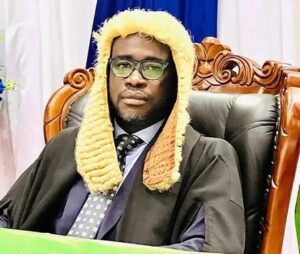By Musa Paul Feika
In a Radio Democracy 98.1 popular ‘Good Morning Salone’ programme aired on Wednesday, 15th January, 2025, the Anti-Corruption Commission boss, Francis Ben Kaifala lashed at the Deputy Speaker of Parliament and Chairman of the Public Accounts Committee (PAC) Hon. Ibrahim Tawa Conteh as putting up “Parliamentary Gangsterism” following his statement that the ACC should not subpoena any Ministry, Department and Agency (MDAs) for investigation relating to the 2023 Auditor-General’s report unless parliament so gives such order.
Francis Ben Kaifala’s lashing comes two days after the Deputy Speaker’s stern warning to the ACC to hands off the 2023 Auditor-General’s report.

Many Sierra Leoneans who listened to the said Radio programme in which Francis Ben Kaifala was a Studio Guest as, “arrogant, disrespectful and an affront to the Deputy Speaker of the country’s Parliament.
Hon. Tawa Conteh has on several occasions made it clear that audit reports from the Auditor-General are properties of the House of Parliament.
Since Hon. Tawa Conteh became Chairman of the Public Accounts Committee last year, he has recovered huge amounts of money on behalf of the Government of Sierra Leone that runs in Billions of Leones. As of now, he stands to hold the record so far of being the most pro-active PAC Chairman.
The statement of the ACC boss, by all indications is a manifestation of his frustration that the PAC appears to be usurping its functions. But the irony here is, the ACC Kaifala had at a press conference held at their Integrity House at Tower Hill in Freetown, acquiesced to the robustness of the Deputy Speaker and Chairman of PAC in his recovery of money belonging to the people of Sierra Leone.
Some citizens are of the view that Ben Kaifala’s outburst cannot be unconnected to cut or reduction of the streamline commission pay his anti-graft commission receives from any amount retrieved.
The ongoing dispute between the Parliament of Sierra Leone and the Anti-Corruption Commission (ACC) boss Francis Ben Kaifala regarding the ownership and jurisdiction of the Auditor General’s Report has ignited a substantial debate about the constitutional interpretations of roles of the various institutions of government.
The bone of contention is surrounding this seeming macabre between Francis Ben Kaifala and the Deputy Speaker of Parliament lies in which of the two institutions reserves authority and control over the Auditor-General’s reports with each claim statutory rights and authority over same.
This complex issue hinges on the interpretation of the 1991 Constitution of Sierra Leone, which clearly outlines the functions and responsibilities of essential oversight institutions, including Parliament, the Auditor General’s Office, and that of the ACC.
According to Section 119 (4) of 1961 Constitution, the Auditor General is mandated to deliver audit reports directly to Parliament. This stipulation positions Parliament as the constitutional guardian of the Auditor General’s Report, affirming its pivotal role in reviewing and deliberating on it.
Acting on the insights gleaned from the report, the Public Accounts Committee (PAC), a vital Parliamentary oversight organ, is charged with the responsible to scrutinize or probe into the financial spending of Ministries, Departments and Agencies and examining the report to identify and address any issues concerning public financial management and irregularities in a transparent manner in line with legislative requirements. This authority is grounded in Parliament’s overarching mandate to oversee the executive branch and ensure accountability in the management of public resources.
Conversely, the Anti-Corruption Commission, established under the Anti-Corruption Act of 2008 and amended in 2019, with the primary responsibility of investigating and prosecuting corruption-related offences.
While offences empowered to take action based on instances of corruption that are illuminated in the Auditor General’s Report, its role is distinct from that of Parliament. The ACC’s engagement with the report is ancillary, as it utilizes the findings to guide its investigative approaches.
The Deputy Speaker in the Sixth Parliament Hon. Ibrahim Tawa Conteh had said that the audit report is the property of the House of Parliament as spelt out in the 1991 Constitution of Sierra Leone.
The tension between the two institutions has raised serious concern about overlapping institutional functions and the absence of clearly defined authority boundaries.
Parliament has consistently emphasized that the Auditor General’s Report serves primarily as a mechanism for legislative oversight, arguing that its thorough examination and any subsequent recommendations should rest solely within the realm of elected representatives.
This framework ensures that the findings of the report are subjected to rigorous debate in a democratic context, thus enabling the public to hold the government accountable through transparent and open processes.
Parliament contends that any encroachment or claim of ownership over the report by the ACC undermines its constitutional function and jeopardizes the fundamental principle of separation of powers.
On the other hand, the ACC asserts that it is mandated to combat corruption.
However, the ACC boss involvement in the management of the report—beyond just initiating investigations based on its content—threatens to infringe on parliamentary responsibilities.
This concern is further amplified by the risk of institutional conflicts that could potentially undermine the wider accountability framework.
This brings the fundamental significance of institutional independence and collaboration in governance landscape.
The Auditor General as an autonomous body should audit Ministries, Departments and Agencies without external interference and submit the report directly to Parliament. Although both institutions play crucial roles in fostering transparency and accountability, their roles must be delineated to mitigate redundancy and avoid unnecessary disagreements.
The doctrine of separation of powers enshrined within the Constitution necessitates that each body function within its defined parameters while still collaborating effectively to attain shared objectives.
The findings presented in this report offer invaluable perspectives on the management of public funds and reveal irregularities that necessitate corrective measures.
In conclusion, reconciling the friction between Parliament and the ACC requires a renewed commitment to constitutional principles and a determination to foster institutional harmony.


